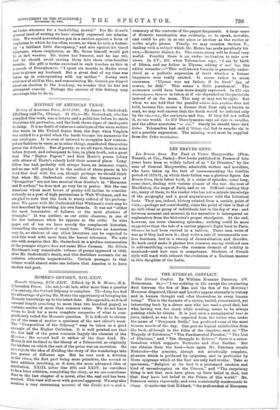HISTORY OF AMERICAN VERSE.
History of American Verse, 1610-1897. By James L. Onderdonk. (McClurg and Co., Chicago. $1 25c.)—Mr. Onderdonk, who has compiled this work, was a lawyer and a politician before he made literature his profession, and the book shows signs of inadequate training. It is no doubt of value as a catalogue of the verse writers who wrote in the United States from the days when Virginia was settled to a period when the bards became too numerous for any catalogue. It is even of interest to recognise how contem- porary fashions in verse, as in other things, manifested themselves across the Atlantic. But of poetry, as we all know, there is none before Bryant, and subsequent to him, in plain truth, not a great deal. The " Biglow Papers" and Bret Harte's poems (along with others of Harte's school) hold their assured place. Long- fellow has had, probably will always have, an immense vogue, and no one will grudge it to the author of those pieces in his work that deal with the sea, though perhaps we should think that when Mr. Onderdonk claims that the hexameters of "Evangeline" are not less musical than Goethe's in "Hermann end Dmothea," he does !not go very far in praise. But the one American whom most lovers of poetry will incline to consider seriously as a poet of high pretensions is Walt Whitman, and we are glad to note that the book is wisely critical of his perform- ance. We agree with Mr. Onderdonk that Whitman's work may be best described by inverting his own formula. It was not "either the most lamentable of failures or the most glorious of triumphs." It was neither, as our critic observes, in one of the few instances when he appears as the critic. In nine pages out of ten we have merely the complacent historian, chronicling the smallest of small beer. Whatever an American may do, no student of any other literature can be expected to read this work with more than the barest tolerance. We note also with surprise that Mr. Onderdonk in a profuse enumeration of the younger singers does not name Bliss Carman. Mr. Edwin Markham's very remarkable volume of poems appeared in 1900, after Mr. Onderdonk's death, and this doubtless accounts for an omission otherwise unpardonable. Certain passages in that volume would almost make one believe that America is to have another real poet.


























































 Previous page
Previous page